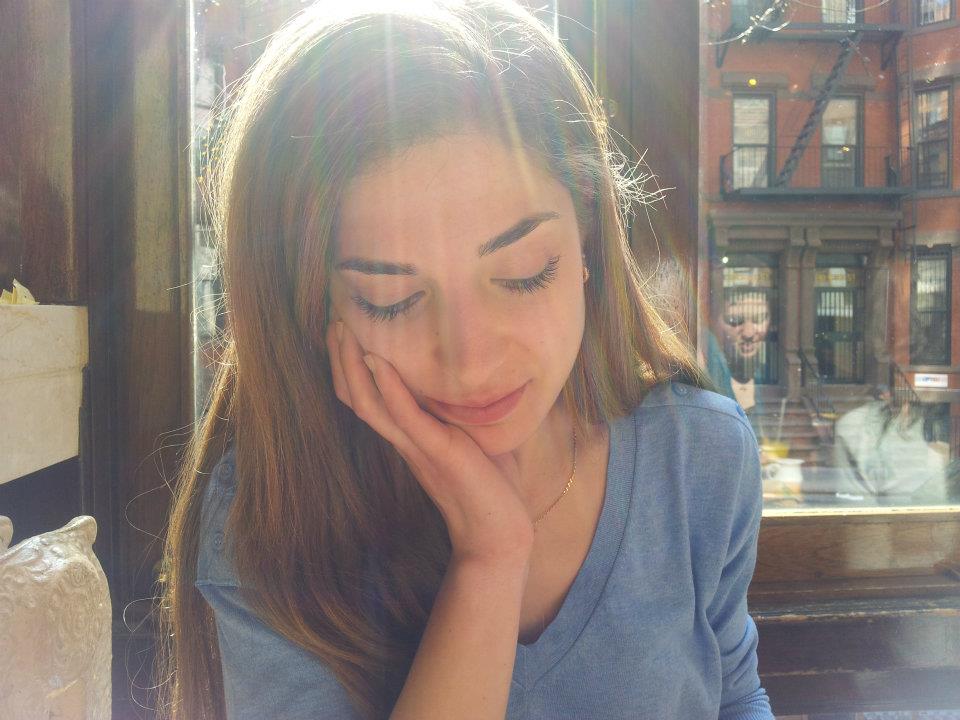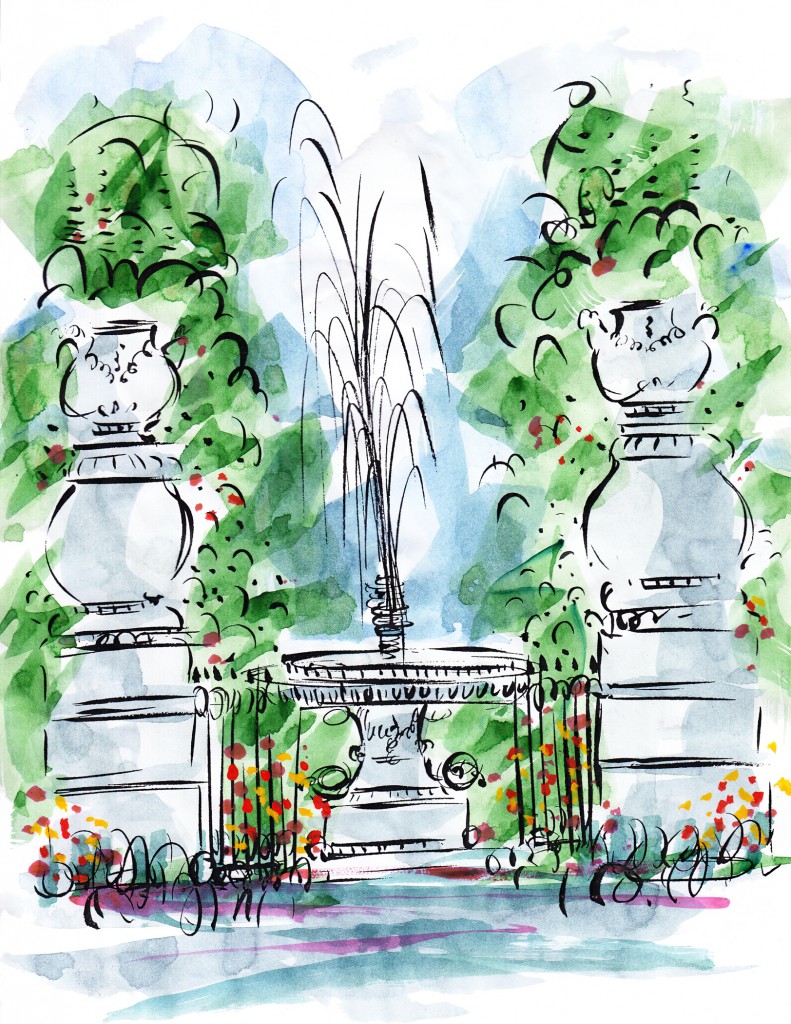Tags
Antoine de Saint-Exupéry, Buddha, Cicero, Confucius, Diogenes, Einstein, Ernest Hemingway, France, George Sand, happiness, Jesus, Keats, Lao Tzu, Leo Tolstoy, Mahatma Gandhi, Mohammad, Paris, Saint Francis of Assisi, Sandburg, Siddhartha Gautama, Thoreau, wabi sabi Zen Buddhism, Wallis Simpson Duchess of Windsor, William Morris, You can never be too rich or too thin Wallis Simpson Duchess of Windsor, Zen Buddhism
Share it
“On Love and Fresh Water” by Yara Y. Zgheib. ©2015 Yara Y. Zgheib. Published with permission. All rights reserved.
We came across a wishing well the other day. I was given one penny, one wish, and a little over one minute to decide how to use it. A minute is very little time when it comes to determining one’s happiness; I take wishing wells seriously.
My mind dashed to the greats for inspiration: Cicero, who said that all he needed was a garden and a library: Einstein, who wished for a table, a chair, a bowl of fruit, and a violin: Thoreau – solitude, and perhaps a single gentle rain. Sandburg – a little love, and a voice to speak to in the day end. I grouped those on one side, along with Lao Tzu, Confucius, Diogenes, Jesus, Mohammad, William Morris, Leo Tolstoy, Mahatma Gandhi, and my good friends Antoine de Saint-Exupéry and Ernest Hemingway in his earlier, poor Paris days.
On the other side, I placed Wallis Simpson, the once Duchess of Windsor, who said, “You can never be too rich or too thin.” With her, all who ever said the same about shoes, clothes, food, housing, and jewelry. So the advertising and marketing departments of every single private and public sector manufacturer of goods and provider of services since the Industrial Revolution.
Once upon a time, someone in France coined the expression “vivre d’amour et d’eau fraîche.” To live simply and freely, “on love and fresh water alone.” I look around, and the world today does not seem to work that way. “People no longer live by sun and moon, by wind and stars, but by some slyly contrived conventions known as clocks and calendars.” Social conventions and expectations, promotions and clearance sales. Descartes, in his day, may have thought (but in this age) “we own, therefore we are.”
In the last 25 years, the average person’s spending increased by at least 30 percent. Houses doubled in size and in number, as did cars, televisions, restaurant meals, clothes, electronics, and recreational expenditures. Today, 52% of Americans regularly spend more than they earn.
We live in a culture where spending has become the ultimate social art, a frantic quest for more, newer, and better. But though more of us own more than ever before, most of us find ourselves with less: Less time for ourselves and those we care about: Less space in our closets and in our jeans: Less savings in our bank accounts and less happiness in our lives.
In this world, the poorest two billion people own less than 50 cents, combined, while the richest individual owns $79.2 billion, a seven-bedroom, 24-bathroom, six-kitchen-and-fireplace home, three cars, one theater, exercise facilities, an Olympic swimming pool … and an island.
In this same world, half the global population does not own a single pair of shoes, while one individual by final count owned 16,400.
I wish there were a way to calculate how much happier 24 bathrooms and 16,400 pairs of shoes can make a person.
Before it became a marketing term synonymous with the spare minimalism of uncomfortable postmodern art and an equally uncomfortable postmodern furniture, simplicity was the “property, condition, or quality of being simple or un-combined.” Old French simplicité meant “singleness of nature, unity, indivisibility.” It was associated with beauty, purity, immutability.
The philosophy of simplicity permeates across time, religion, and space. Siddhartha Gautama, the Buddha, gave up the superficial luxuries of royal life and found spiritual truth in the “Middle Way:” meditative self-discipline in the simple life that exists between worldly indulgence and asceticism. Saint Francis of Assisi, founder of the Franciscan Order, exchanged his clothes with those of a beggar on a business trip to Rome and renounced his inheritance for a simple life harmonious with that of all creatures. The ancient Greeks had their Cynics; the ancient Romans, their Stoics. The Europeans, their bohemians; the Americans, their naturalists. I learned simplicity from my father.
Simplicity is a deliberate choice, “to live our daily lives with some degree of conscious appreciation of the condition of the rest of the world.” To voluntarily consume less, and find happiness beyond the material.
To live simply is to be straightforward. It is not to be simplistic or ignorant.
It is to be uncluttered, not ascetic or plain.
It is to be self-sufficient, not self-deprived.
It is, as George Sand said, “the most difficult thing to secure in this world; it is the last limit of experience and the last effort of genius.”
The Japanese have a beautiful expression for it, rooted in Zen Buddhism: wabi sabi. Loosely translated, wabi means elegant or rustic simplicity. Sabi means the beauty of age and wear. To practice wabi sabi is to celebrate beauty in what is natural, not what is perfect. Simple living, high thinking. It has been called “a quiet revolution.”
Back at the wishing well, my minute came and went, and mon chéri got impatient. Quick – happiness! My mind wandered one last time, to a 6-year-old me cross-legged on the grass, sharing a baguette stuffed with pieces of chocolate with the three people who then made up my world. The best lunch I ever had.
I normally defer to the French when making any decision of consequence to my life, but as I stood by the wishing well, I knew I already had love and fresh water. So I turned to Keats instead; I wished for books, French wine, fruit, fine weather, and a little music played out of doors by somebody I do not know. Then I threw my penny in.
Acknowledgements: Lee Murphy, student of new media communications at the University of Minnesota-Twin Cities and copy editor for A Woman’s Paris.
 Born in Lebanon, Yara Y. Zgheib has traveled and lived in Glasgow, Washington D.C., and Paris, the city that forever has her heart. She is a Fulbright scholar with a Masters degree in security studies and an all but completed PhD in international affairs and diplomacy. More importantly, she is a writer, a political analyst, a daydreamer, and an avid tea drinker.
Born in Lebanon, Yara Y. Zgheib has traveled and lived in Glasgow, Washington D.C., and Paris, the city that forever has her heart. She is a Fulbright scholar with a Masters degree in security studies and an all but completed PhD in international affairs and diplomacy. More importantly, she is a writer, a political analyst, a daydreamer, and an avid tea drinker.
Yara is the author of “Biography of a Little Prince,” and has a second novel, “Letters I’ll Never Send,” scheduled for release in 2015. Her blog, “Aristotle at Afternoon Tea,” is a compilation of weekly essays on politics, art, culture, economics, literature, philosophy, and chocolate… her idea of a smart conversation over afternoon tea. For more information about Yara, visit: (Aristotle at Afternoon Tea)
You may also enjoy A Woman’s Paris® post Travel Diaries: On Where the Heart Is by Yara Y. Zgheib. “They say that home is where the heart is, but my heart is in two places, and nowhere at once,” writes Yara. “Never leave your heart unattended on a transatlantic flight. I forget the cardinal rule of safe travel, the one that should be printed in bold on every safety instruction pamphlet, right above ‘fasten your seatbelt’ and ‘do not smoke in the lavatory.’”
Paris: Little Differences by Elyse Rozina. Punctuality – “Here, in Paris,” writes Elyse, “everything is measured in metro stops and monuments.” “I live at Anvers, just south of Sacre Coeur.” “Be there soon, I’m tree stops away!” From “PDA” (Public Displays of Affection) to “Neckwear and its purposes” to “French children” to “Street sightings” Elyse takes us through a year of living in Paris as an English Language Teaching Assistant and the little differences she discovered there.
My Imaginary Paris by Elyse Rozina. “If I could be anywhere in the world right now,” writes Elyse, “I would be slowly walking through the Marais on my way to ObLaDi Café.” Her fanciful, fabulous world of Paris in 2014 when Elyse was an English Language teaching assistant and the idyllically storybook finish she found there.
Travel Diaries: On A Moveable Feast (Paris) by Yara Y. Zgheib. Only in Paris can a cold and rainy April day be romantic. Yara takes us cobblestone streets and narrow steps; Acrocc bridges and through gilded archways: Into smelly cheese shops and out of crowded Thursday markets: Past the queue of ignorant tourists outside Ladurée and toward the infinitely better Pierre Hermé. “A weekend in Paris is not enough,” writes Yara. “Nor is a year, or a lifetime. One more café-croissant express, then she heads for the plane.
On Doing and Being by Yara Y. Zgheib. “La bohème.” It was French novelist Henri Murger who first romanticized the expression in his 1847 novel, ‘Scènes de la vie de bohème.’ For Murger it came to mean ‘a world of artists, social rebels, and radicals who rejected the comforts of the bourgeoisie, opting instead for poverty, and believing that any true experience demanded suffering. They were committed to a life of freedom, work, and pleasure, and eschewed the corruption and rotten values of conventional society.’ Trust the Parisians to elevate starving to death to an art form.
On Fifth Avenue, at Five in the Morning by Yara Y. Zgheib. In the legendary opening scene, a slender Holly Golightly in black Givenchy evening gown eats a Danish and peers into the windows of a closed jewelry store on a deserted Fifth Avenue in New York City. She has what she calls the “Mean Reds,” that errifying feeling you get when life has been unkind and the future is uncertain. “What we believe,” writes Yara “is not as important as why we believe.”
To the South of France with Love. Sara Horsley invites us into her world to share six weeks in Arles, France, during a study abroad program. There, she learned about the French culture and their respect and admiration of artistic expression.
A Woman’s Paris: A global gateway to everything French, by Eric Best (reprinted with permission from A Northeast Francophile, published by the Journal). While Barbara Redmond is far from an aristocratic jetsetter, she once thought of herself as a Francophile. A Woman’s Paris readers can expect posts of French art and literature, first-person stories from Redmond and contributors about travelling and interviews with authors.
Text copyright ©2015 Yara Y. Zgheib. All rights reserved.
Illustration copyright ©2014 Barbara Redmond. All rights reserved.
barbara@awomansparis.com



3 comments
Pam said:
September 2, 2015 at 8:23 am
Barbara — No longer a Francophile?
A Woman’s Paris™ said:
September 2, 2015 at 9:24 am
Bonjour Pam,
It was the last paragraph of Yara’s story “On Love and Fresh Water” that embodied this story with its French aesthetic.
“I normally defer to the French when making any decision of consequence to my life, but as I stood by the wishing well, I knew I already had love and fresh water. So I turned to Keats instead; I wished for books, French wine, fruit, fine weather and a little music played out of doors by somebody I do not know. Then I threw my penny in.” – Yara Y. Zgheib
Barbara Redmond
Publisher, AWomansParis.com
Susan said:
September 2, 2015 at 6:20 am
Loving this